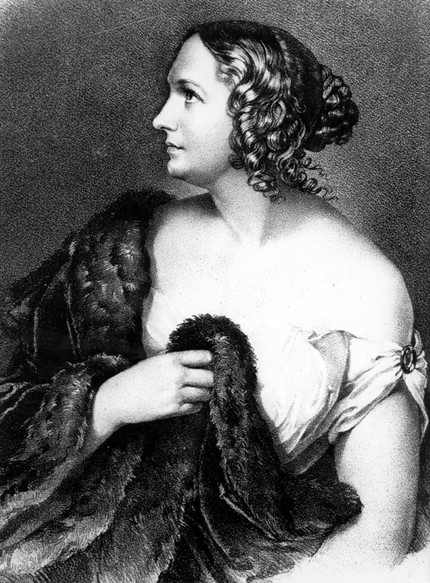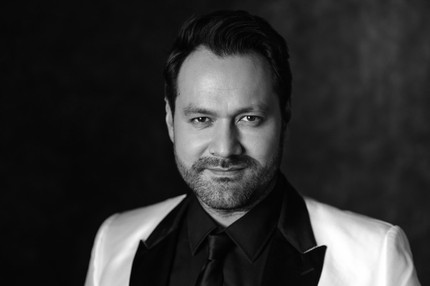
Wilhelmine Schröder-Devrient |
Wilhelmine Schröder-Devrient

Wilhelmina Schroeder was born on December 6, 1804 in Hamburg. She was the daughter of the baritone singer Friedrich Ludwig Schröder and the famous dramatic actress Sophia Bürger-Schröder.
At an age when other children spend time in carefree games, Wilhelmina has already learned the serious side of life.
“From the age of four,” she says, “I already had to work and earn my bread. Then the famous ballet troupe Kobler wandered around Germany; she also arrived in Hamburg, where she was particularly successful. My mother, highly receptive, carried away by some idea, immediately decided to make a dancer out of me.
My dance teacher was African; God knows how he ended up in France, how he ended up in Paris, in the corps de ballet; later moved to Hamburg, where he gave lessons. This gentleman, named Lindau, was not exactly angry, but quick-tempered, strict, sometimes even cruel …
At the age of five I was already able to make my debut in one Pas de chale and in an English sailor dance; They put on my head a gray downy hat with blue ribbons, and on my feet they put shoes with wooden soles. About this first debut, I only remember that the audience enthusiastically accepted the little dexterous monkey, my teacher was unusually happy, and my father carried me home in his arms. My mother had promised me since morning either to give me a doll or to flog me, depending on how I completed my task; and I am sure that fear contributed a lot to the flexibility and lightness of my childish limbs; I knew that my mother did not like to joke.
In 1819, at the age of fifteen, Wilhelmina made her debut in drama. By this time, her family had moved to Vienna, and her father had passed away a year earlier. After long studies at the ballet school, she performed with great success the role of Aricia in “Phaedra”, Melitta in “Sappho”, Louise in “Deceit and Love”, Beatrice in “The Bride of Messina”, Ophelia in “Hamlet”. At the same time, her musical abilities were revealed more and more clearly – her voice became strong and beautiful. After studying with Viennese teachers D. Motsatti and J. Radiga, Schroeder changed drama to opera a year later.
Her debut took place on January 20, 1821 in the role of Pamina in Mozart’s The Magic Flute on the stage of the Viennese Kärntnertorteatr. The music papers of the day seemed to outdo each other in terms of rapture, celebrating the arrival of a new artist on the stage.
In March of the same year, she played the role of Emeline in The Swiss Family, a month later – Mary in Gretry’s Bluebeard, and when Freischutz was first staged in Vienna, the role of Agatha was given to Wilhelmina Schroeder.
The second performance of Freischütz, on March 7, 1822, was given at Wilhelmina’s benefit performance. Weber himself conducted, but the delight of his fans made the performance almost impossible. Four times the maestro was called to the stage, showered with flowers and poems, and in the end a laurel wreath was found at his feet.
Wilhelmina-Agatha shared the evening’s triumph. This is that blonde, that pure, meek creature that the composer and poet dreamed of; that modest, timid child who is afraid of dreams is lost in forebodings, and meanwhile, by love and faith, is ready to conquer all the forces of hell. Weber said: “She is the first Agatha in the world and surpassed everything that I imagined creating this role.”
The real fame of the young singer brought the performance of the role of Leonora in Beethoven’s “Fidelio” in 1822. Beethoven was very surprised and expressed displeasure, how could such a majestic role be entrusted to such a child.
And here’s the performance … Schroeder – Leonora gathers her strength and throws herself between her husband and the killer’s dagger. The terrible moment has arrived. The orchestra is silent. But a spirit of despair took possession of her: loudly and clearly, more than a cry, she breaks out from her: “Kill his wife first!” With Wilhelmina, this is really the cry of a man freed from a terrible fright, a sound that shook the listeners to the marrow of their bones. Only when Leonora, to Florestan’s prayers: “My wife, what have you suffered because of me!” – either with tears, or with delight, he says to him: “Nothing, nothing, nothing!” – and falls into the arms of her husband – then only as if the weight fell off the hearts of the spectators and everyone sighed freely. There was applause that seemed to have no end. The actress found her Fidelio, and although she subsequently worked hard and seriously on this role, the main features of the role remained the same as it was unconsciously created that evening. Beethoven also found his Leonora in her. Of course, he could not hear her voice, and only from facial expressions, from what was expressed on her face, in her eyes, could he judge the performance of the role. After the performance, he went to her. His usually stern eyes looked at her affectionately. He patted her on the cheek, thanked her for Fidelio, and promised to write a new opera for her, a promise which, unfortunately, was not fulfilled. Wilhelmina never again met the great artist, but in the midst of all the praise that the famous singer was showered with later, a few words of Beethoven were her highest reward.
Soon Wilhelmina met the actor Karl Devrient. A handsome man with attractive manners very soon took possession of her heart. Marriage with a loved one is a dream she aspired to, and in the summer of 1823 their marriage took place in Berlin. After traveling for some time in Germany, the artistic couple settled in Dresden, where both of them were engaged.
The marriage was unhappy in every way, and the couple formally divorced in 1828. “I needed freedom,” Wilhelmina said, “so as not to die as a woman and an artist.”
This freedom cost her many sacrifices. Wilhelmina had to part with the children whom she passionately loved. The caresses of children – she has two sons and two daughters – she also lost.
After the divorce from her husband, Schroeder-Devrient had a stormy and difficult time. Art was and remained for her to the very end a sacred affair. Her creativity no longer depended on inspiration alone: hard work and science strengthened her genius. She learned to draw, sculpt, knew several languages, followed everything that was done in science and art. She rebelled indignantly against the absurd idea that talent does not need science.
“For the whole century,” she said, “we have been looking for, achieving something in art, and that artist perished, died for art, who thinks that his goal has been achieved. Of course, it is extremely easy, along with the costume, to lay aside all worries about your role until the next performance. For me it was impossible. After loud applause, showered with flowers, I often went to my room, as if checking myself: what have I done today? Both seemed bad to me; anxiety seized me; day and night I pondered in order to achieve the best.
From 1823 to 1847, Schröder-Devrient sang at the Dresden Court Theatre. Clara Glumer writes in her notes: “Her whole life was nothing but a triumphal procession through German cities. Leipzig, Vienna, Breslau, Munich, Hanover, Braunschweig, Nuremberg, Prague, Pest, and most often Dresden, alternately celebrated her arrival and appearance on their stages, so that from the German Sea to the Alps, from the Rhine to the Oder, her name sounded, repeated by an enthusiastic crowd. Serenades, wreaths, poems, cliques and applause greeted and saw off her, and all these celebrations affected Wilhelmina in the same way that fame affects a true artist: they forced her to rise higher and higher in her art! During this time, she created some of her best roles: Desdemona in 1831, Romeo in 1833, Norma in 1835, Valentine in 1838. Altogether, from 1828 to 1838, she learned thirty-seven new operas.
The actress was proud of her popularity among the people. Ordinary workers took off their hats when they met her, and the merchants, seeing her, pushed each other, calling her by name. When Wilhelmina was about to leave the stage altogether, a theater carpenter purposely brought his five-year-old daughter to the rehearsal: “Take a good look at this lady,” he said to the little one, “this is Schroeder-Devrient. Do not look at others, but try to remember this one for the rest of your life.
However, not only Germany was able to appreciate the talent of the singer. In the spring of 1830, Wilhelmina was engaged to Paris for two months by the directorate of the Italian Opera, which ordered a German troupe from Aachen. “I went not only for my glory, it was about the honor of German music,” she wrote, “if you don’t like me, Mozart, Beethoven, Weber must suffer from this! That’s what’s killing me!”
On May XNUMX, the singer made her debut as Agatha. The theater was full. The audience was waiting for the performances of the artist, whose beauty was told by miracles. At her appearance, Wilhelmina was very embarrassed, but immediately after the duet with Ankhen, loud applause encouraged her. Later, the stormy enthusiasm of the public was so strong that the singer began to sing four times and could not, because the orchestra could not be heard. At the end of the action, she was showered with flowers in the full sense of the word, and on the same evening they serenade her – Paris recognized the singer.
“Fidelio” made an even greater sensation. Critics spoke of her like this: “She was born specifically for Beethoven’s Fidelio; she doesn’t sing like the others, she doesn’t talk like the others, her acting is completely unsuitable for any art, it’s as if she doesn’t even think about what she is on the stage! She sings more with her soul than with her voice… she forgets the audience, forgets herself, incarnating in the person she portrays…” The impression was so strong that at the end of the opera they had to raise the curtain again and repeat the finale, which had never happened before.
Fidelio was followed by Euryant, Oberon, The Swiss Family, The Vestal Virgin and The Abduction from the Seraglio. Despite the brilliant success, Wilhelmina said: “It was only in France that I clearly understood the whole peculiarity of our music, and no matter how noisily the French accepted me, it was always more pleasant for me to receive the German public, I knew that she understood me, while the French fashion comes first.”
The following year, the singer again performed in the capital of France at the Italian Opera. In rivalry with the famous Malibran, she was recognized as equal.
Engagement at the Italian Opera contributed a lot to her fame. Monck-Mazon, director of the German-Italian Opera in London, entered into negotiations with her and on March 3, 1832, engaged for the rest of the season of that year. Under the contract, she was promised 20 thousand francs and a benefit performance in two months.
In London, she was expected to succeed, which was equaled only by the success of Paganini. In the theater she was greeted and accompanied by applause. English aristocrats considered it their duty to the art to listen to her. No concert was possible without a German singer. However, Schroeder-Devrient was critical of all these signs of attention: “During the performance, I had no consciousness that they understood me,” she wrote, “most of the public was only surprised at me as something unusual: for society, I was nothing more than a toy that is now in fashion and which tomorrow, perhaps, will be abandoned … “
In May 1833, Schroeder-Devrient again went to England, although the previous year she had not received her salary agreed in the contract. This time she signed a contract with the theater “Drury Lane”. She had to sing twenty-five times, receive forty pounds for the performance and benefit. The repertoire included: “Fidelio”, “Freischütz”, “Eurianta”, “Oberon”, “Iphigenia”, “Vestalka”, “Magic Flute”, “Jessonda”, “Templar and Jewess”, “Bluebeard”, “Water carrier “.
In 1837, the singer was in London for the third time, engaged for the English opera, in both theaters – Covent Garden and Drury Lane. She was to debut in Fidelio in English; this news aroused the greatest curiosity of the English. The artist in the first minutes could not overcome embarrassment. In the first words that Fidelio says, she has a foreign accent, but when she began to sing, the pronunciation became more confident, more correct. The next day, the papers announced unanimously that Schroeder-Devrient had never sung so delightfully as she had this year. “She overcame the difficulties of language,” they added, “and proved beyond doubt that the English language in euphony is as superior to German as Italian in turn is superior to English.”
Fidelio was followed by Vestal, Norma and Romeo – a huge success. The peak was the performance in La sonnambula, an opera that seemed to be created for the unforgettable Malibran. But Amina Wilhelmina, by all accounts, surpassed all her predecessors in beauty, warmth and truth.
Success accompanied the singer in the future. Schröder-Devrient became the first performer of the parts of Adriano in Wagner’s Rienzi (1842), Senta in The Flying Dutchman (1843), Venus in Tannhäuser (1845).
Since 1847, Schroeder-Devrient has performed as a chamber singer: she toured in the cities of Italy, in Paris, London, Prague, and St. Petersburg. In 1849, the singer was expelled from Dresden for participating in the May Uprising.
Only in 1856 did she again begin to perform publicly as a chamber singer. Her voice then was no longer completely flawless, but the performance was still distinguished by the purity of intonation, distinct diction, and the depth of penetration into the nature of the created images.
From the notes of Clara Glumer:
“In 1849, I met Mrs. Schröder-Devrient at St. Paul’s Church in Frankfurt, was introduced to her by a common acquaintance and spent several pleasant hours with her. After this meeting I did not see her for a long time; I knew that the actress had left the stage, that she had married a nobleman from Livland, Herr von Bock, and lived now on her husband’s estates, now in Paris, now in Berlin. In 1858 she arrived in Dresden, where for the first time I saw her again in a concert of a young artist: she appeared before the public for the first time after many years of silence. I will never forget the moment when the tall, majestic figure of the artist appeared on the dais, met with noisy applause from the public; touched, but still smiling, she thanked, sighed, as if drinking in the stream of life after a long deprivation, and finally began to sing.
She began with Schubert’s Wanderer. At the first notes I was involuntarily frightened: she is no longer able to sing, I thought, her voice is weak, there is neither fullness nor melodic sound. But she did not reach the words: “Und immer fragt der Seufzer wo?” (“And he always asks for a sigh – where?”), as she already took possession of the listeners, dragged them along, alternately forcing them to move from longing and despair to the happiness of love and spring. Lessing says of Raphael that “if he had no hands, he would still be the greatest painter”; in the same way it can be said that Wilhelmina Schroeder-Devrient would have been a great singer even without her voice. So powerful was the charm of the soul and the truth in her singing that we, of course, did not have to, and will not have to hear anything like that!
The singer died on January 26, 1860 in Coburg.
- Singing tragic actress →





